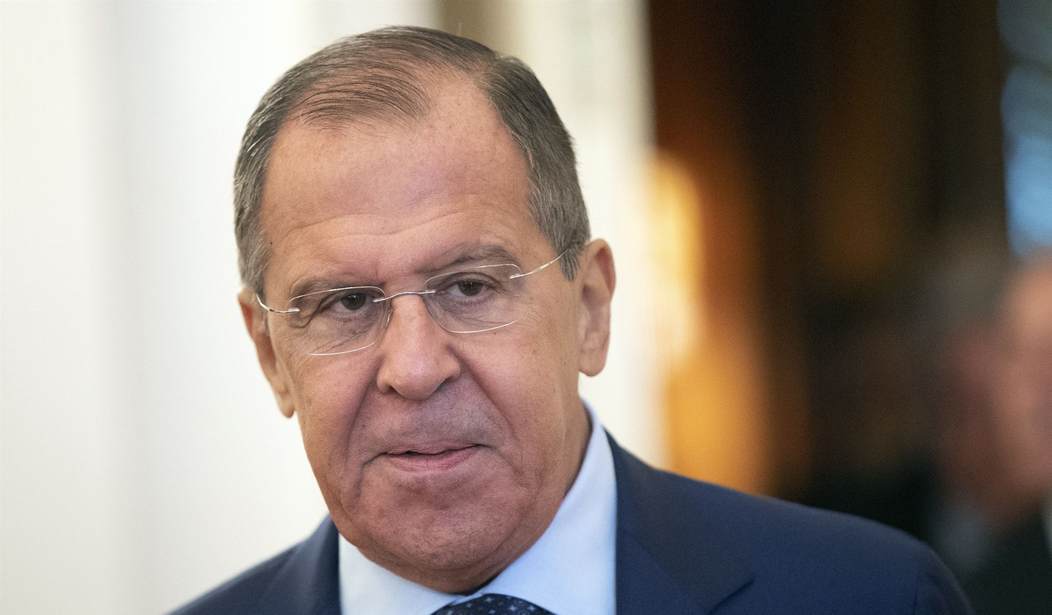Well, sure, that’s one way to look at sending a MiG-29 to intercept a commercial airliner in order to arrest a blogger. As expected, Russia has circled its wagon around Alexander Lukashenko after the shameful skyjacking and kidnapping of civilian travelers under the ruse of a phony bomb threat. Foreign minister Sergei Lavrov cautioned Western leaders against any sanctions until after Belarus completes a promised independent investigation, calling Lukashenko’s actions “absolutely reasonable”:
Lavrov told journalists that Belarus had treated the incident with an “absolutely reasonable approach”.
“A representative of the Belarusian foreign ministry… stressed the readiness of the Belarusian authorities to act on the issue in a transparent manner and to follow all international rules,” Lavrov said during a press conference following a meeting with his Greek counterpart.
“I think this is an absolutely reasonable approach.”
He called on the global community to “soberly assess the situation”.
Perhaps that’s what passes for “absolutely reasonable” in PutinWorld, where “reasonable” also includes an epidemic of journalists falling out of windows and dissidents getting poisoned to death. The rest of the world does not appear to agree, nor do they take Lukashenko’s idea of an independent investigation very seriously. Instead, EU officials are planning on retaliation against Belarus, although they are still debating the form of the punishment:
European leaders on Monday were considering a plan to sever Belarus from the rest of the continent’s airspace, a day after Belarusian authorities forced a commercial airliner to land and arrested a dissident journalist who had been flying from Athens to Lithuania. …
E.U. leaders converging on Brussels on Monday were considering a European ban on flights from Belavia, the Belarusian national airline, declaring Belarus’s airspace unsafe and other measures to strike back at the move, according to diplomats and other officials involved in the discussions.
A ban on Belavia would be a blow to Belarus’s already shaky economy.
“We have faced state-sponsored air piracy, which many even call an act of terrorism,” Latvian Foreign Minister Edgars Rinkevics told Latvian Radio on Monday. “It is already a threat to international security and order.”
Ireland’s foreign minister told RTÉ earlier that they have good reason to suspect the bomb threat was a ruse. Not only did the plane not get routed to the nearest airport, Simon Coveney said, but several other people mysteriously decided to stay in Minsk even though they weren’t being detained:
“It was intercepted, there was effectively warning given to the pilots and crew that there was a security risk on board, and then the plane was escorted by military jet to the Minsk airport, which was not the closest airport,” Irish Foreign Minister Simon Coveney told Ireland’s RTE radio on Monday.
“People came on board and then arrested this journalist who was involved in the opposition movement,” he said, calling it “aviation piracy.”
Coveney said that only one or two people were actually arrested from the plane, but five or six people stayed on the ground in Belarus. “So that certainly would suggest that a number of other people who left the plane were secret service,” he said. “We don’t know from what country, but clearly linked to the Belarusian regime.”
That’s very interesting. There would be little if any reason for people who wanted to go to Minsk to take a flight from Athens to Vilnius. Coveney suggests that this was an intelligence operation all along, which seems pretty likely considering the capture of dissident Roman Protasevich.
The isolation of Belarus appears to be a wise course of action at the moment, especially with Russia claiming this to be an “absolutely reasonable approach.” The EU already has some sanctions on Belarus and Lukashenko over the rigged election that Protasevich has campaigned to overturn, so there may not be a lot of room for more economic punishment. By cutting off Belarus and especially its airlines from access to the EU, however, that will force Russia to subsidize Lukashenko to keep him in power. That’s costly in the long run to Vladimir Putin, but he might see it as a necessary sacrifice to keep Belarus from spinning out of Moscow’s orbit like Ukraine did in 2014.







Join the conversation as a VIP Member